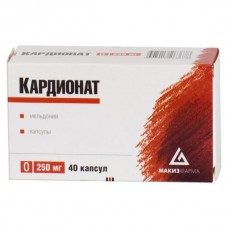Expiration date: 04/2026
Description pharmaceutical form:
250 mg capsules: Hard gelatin capsules ? 1 white. The contents of capsules - a white or almost white crystalline powder with a weak smell. Hygroscopic powder, caking allowed.
Solution for injection: clear, colorless liquid.
Pharmacokinetics:
After intake of rapidly absorbed, bioavailability - 78%. Cmax plasma levels achieved in 1-2 hours after administration. It is metabolized in the body into two major metabolites which the kidneys. T1 / 2 when administered depends on the dose of 3-6 hours.
Description of the pharmacological actions:
The synthetic analogue of gamma-butyrobetaine, inhibits gamma butirobetaingidroksilazu, reduces the synthesis of carnitine and transport of long-chain fatty acids across cell membranes, prevents the accumulation in the cells of the activated forms of unoxidized fatty acids - derivatives of acylcarnitine and atsilkofermenta A.
Cardioprotective agent normalizing myocardial metabolism. The ischemia restores the balance of oxygen delivery and consumption processes in cells, prevents violation transport ATP simultaneously activates glycolysis, which proceeds without the use of supplemental oxygen. As a result of reducing the concentration of carnitine is synthesized hard gamma-butyrobetaine, which has vasodilating properties. The mechanism of action determines the diversity of its pharmacological effects: increasing efficiency, reducing the symptoms of mental and physical stress, tissue and activation of humoral immunity, cardioprotective effects. In the case of acute ischemic myocardial damage slows the formation of necrotic areas, reduces the rehabilitation period.
In heart failure, increases myocardial contractility, increases exercise tolerance, reduces the frequency of angina attacks. In acute and chronic ischemic cerebrovascular disorders improves blood circulation in the ischemic focus, promotes redistribution of blood to the ischemic area. It is effective in the case of vascular and dystrophic pathology of the ocular fundus. It is also characteristic tonic effect on the central nervous system, elimination of functional disturbances of somatic and autonomic nervous system in patients with chronic alcoholism during abstinence.
Testimony:
- decreased performance, physical stress (including the athletes), post-operative period to accelerate rehabilitation
- as part of combination therapy of ischemic heart disease (angina), congestive heart failure, in the background cardialgia dyshormonal myocardial dystrophy
- alcohol withdrawal syndrome (in combination with specific therapy)
- violation of cerebral circulation (stroke, cerebrovascular insufficiency).
Additionally for solution for injection:
acute circulatory disorder in the retina, hemophthalmus and retinal hemorrhages of different etiologies, thrombosis of the central retinal vein and its branches, retinopathy of various etiologies (including diabetic and hypertensive) - only for parabulbarno administration.
Contraindications:
- Hypersensitivity to the drug
- increased intracranial pressure (in violation of the venous outflow, intracranial tumors)
- age of 18 years (effectiveness and safety have been established)
- pregnancy
- lactation.
Precautions: liver and / or kidneys.
Application of pregnancy and breastfeeding:
The safety of the drug has not been proved during pregnancy. To avoid possible adverse effects on the fetus during pregnancy, it is not prescribed.
It is not clear whether the drug is excreted in breast milk. If kardionatom treatment for the mother is necessary, breast-feeding is stopped.
Side effect:
Rarely - allergic reactions (redness, rash, itching, swelling), as well as dyspepsia, tachycardia, decreased blood pressure, agitation.
Drug Interactions:
It increases the vasodilatig funds, some antihypertensive drugs, cardiac glycosides.
It can be combined with antianginal drugs, anticoagulants, antiplatelet agents, antiarrhythmics, diuretics, bronchodilators.
In view of the possible development of mild tachycardia and hypotension should be careful in combination with nitroglycerin, nifedipine, alpha-blockers, antihypertensive agents and peripheral vasodilators.
Dosage and administration:
Capsules: inside, swallowing whole with water.
In view of the possible development of stimulating effect it is recommended to use in the morning.
Stable Angina - 0.5-1 g per day in one or two divided doses for the first 3-4 days, then - 2 times a week. The course of treatment - 4-6 weeks.
Cardialgia amid dyshormonal myocardial dystrophy - 500 mg per day. The course of treatment - 12 days.
Alcoholism - 0.5 g 4 times a day. The course of treatment - 7-10 days.
Chronic disorders of cerebral circulation - 0.5 grams per day. The course of treatment - 2-3 weeks.
By reducing the health and physical overexertion (including the athletes). Adults - 0.5-1 g 1-2 reception. The course of treatment - 10-14 days. If necessary, repeat the treatment after 2-3 weeks.
Athletes - 0.5-1 g, 2 times daily before training. The duration of the preparatory period - 14-21 days, during the period of competition - 10-14 days.
Solution for injection: in / in, in / m, and retrobulbarno subkonyunktivalno.
Increased mental and physical activity: a / c, 10 ml of 1 time per day. The course of treatment - 10-14 days. If necessary, repeat the course in 2-3 weeks.
In cardiovascular diseases (in the complex therapy): I / O, 5-10 ml solution for injection (500 mg / 5 ml) treatment course - 10-14 days.
Violations of cerebral circulation: the acute phase - I / O, 500 mg 1 time per day for 7-10 days, then move on to oral.
Chronic cerebral circulatory insufficiency: a / m 1 500 mg once a day. The course of treatment - 10-14 days, then move on to oral.
Alcoholism: w / w, 500 mg 2 times a day. The course of treatment - 7-10 days.
Vascular disease and fundus retinal dystrophy: subconjunctival and retrobulbar administered 0.5 ml injection of 500 mg / 5 ml for 10 days.
Overdose:
Overdose Cases Kardionata unknown. The drug has low toxicity and does not cause side effects that are dangerous to the health of patients.
Special instructions:
Patients with chronic diseases of the liver and kidneys should be careful with long-term use of the drug. There is insufficient data on the use kardionata children.
Trimethylhydrazinium propionate dihydrate is not the drug of I series with acute coronary syndrome, and its use is not absolutely necessary.
No data on the adverse effects of the drug on the rate of psychomotor reactions.




